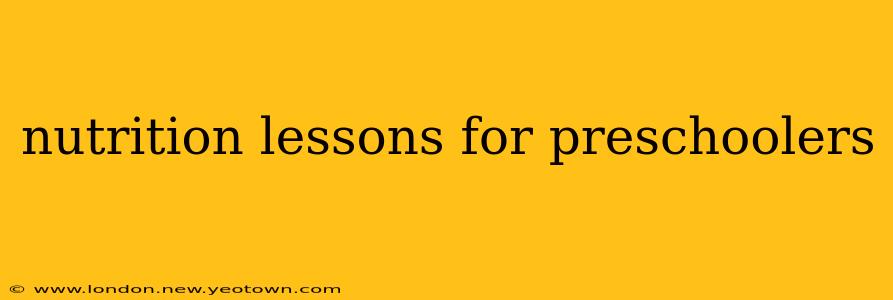My name is Sarah, and I've spent the last decade working as a preschool teacher and curriculum developer. I've seen firsthand the impact of early nutrition education on a child's development and future health. This isn't just about teaching kids to eat their vegetables; it's about fostering a lifelong love for healthy eating and empowering them to make informed choices. This post explores fun and effective ways to teach preschoolers about nutrition. Let's dive in!
Why Teach Preschoolers About Nutrition?
The preschool years are a crucial time for establishing healthy eating habits. Children at this age are incredibly curious and receptive to new information, making it an ideal time to introduce fundamental nutrition concepts. Teaching them early can prevent the development of unhealthy eating patterns and set the stage for a lifetime of well-being.
What are the basic food groups for preschoolers?
This is often a primary question parents and educators have. We can simplify the food groups for preschoolers using a fun, relatable approach. Instead of complex charts, we can use colorful pictures and simple explanations. We can talk about:
- Fruits and Vegetables: These are our body's superheroes, giving us energy and keeping us healthy! Think colorful rainbows of fruits and crunchy, colorful veggies.
- Grains: These are our energy powerhouses, fueling our bodies for play and learning. Think of whole-wheat bread, brown rice, and yummy oatmeal.
- Protein: These are our body builders, helping us grow strong and tall. Think of lean meats, eggs, beans, and lentils. We can also make it fun by relating it to building blocks!
- Dairy: This helps our bones grow strong like mighty trees. Think of milk, yogurt, and cheese.
Remember, moderation is key. We avoid focusing on "good" or "bad" foods, instead emphasizing balance and variety.
How can I make learning about nutrition fun for preschoolers?
Learning about nutrition doesn't have to be a chore! Here are some fun and engaging ideas:
- Interactive Games: Create a game where children sort pictures of foods into their respective food groups. This makes learning interactive and enjoyable.
- Cooking Activities: Involve preschoolers in simple cooking tasks, like washing vegetables or mixing ingredients. This not only teaches them about food but also develops valuable life skills.
- Storytelling: Use stories to convey nutritional messages. Create a story about a superhero who gets their powers from eating healthy foods.
- Field Trips: Visit a farmer's market or a local farm to see where food comes from. This helps children connect with their food and understand its origins.
- Arts and Crafts: Use food as art materials! Create collages with pictures of fruits and vegetables or make fruit salad prints.
What are some age-appropriate activities to teach preschoolers about healthy eating?
We can tailor activities to a preschooler's developmental stage. Here are some ideas:
- Taste Tests: Introduce children to a variety of fruits and vegetables, encouraging them to try new flavors. Even tiny tastes can broaden their palate.
- MyPlate Activities: Use MyPlate as a visual guide to help preschoolers understand portion sizes and food group balance. You can create a simple MyPlate game or coloring sheet.
- Grow Your Own Food: Plant seeds or sprouts in the classroom. This shows children how food grows, making them more interested in eating it.
How do I encourage picky eaters to try new foods?
Picky eating is a common challenge for preschoolers. The key is patience and persistence. Here are some strategies:
- Positive Reinforcement: Praise children for trying new foods, even if they only take a small bite.
- Repeated Exposure: Offer new foods multiple times. It can take several tries before a child accepts a new food.
- Involve Children in Food Preparation: Allowing them to participate in the preparation process can make them more willing to try the finished product.
- Be a Role Model: Children learn by observing their parents and teachers. Make sure you're also eating a healthy and varied diet.
Remember, teaching nutrition to preschoolers is about fostering a positive relationship with food. It's about creating a foundation for healthy habits that will last a lifetime. By making learning fun, engaging, and age-appropriate, we can plant the seeds of healthy eating in young minds.

